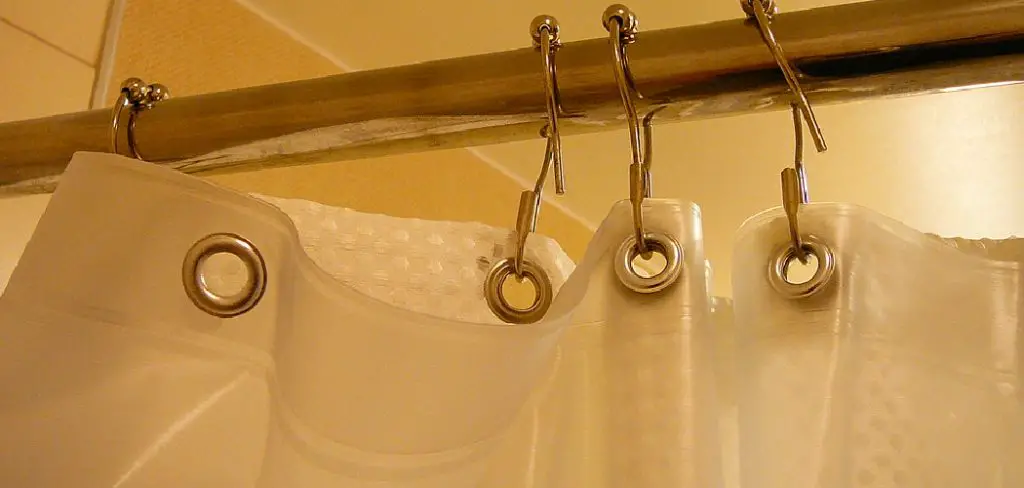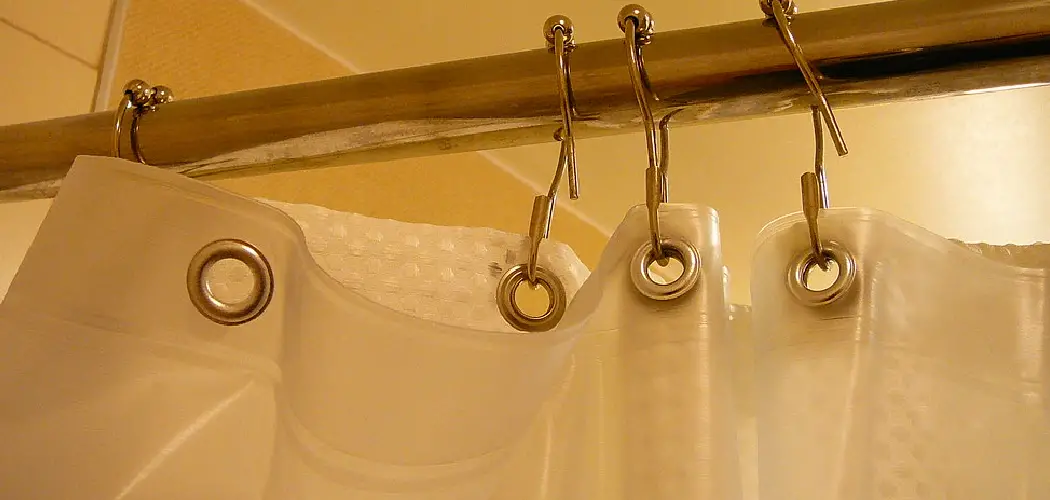Are you inquiring about why is my shower curtain turning orange? You are not alone! Many homeowners have noticed their shower curtains turning a shade of orange, and it can be quite perplexing. In this guide, we will explore the reasons behind this phenomenon and possible solutions to prevent it from happening in the future.

You are not alone if you’ve noticed your shower curtain turning orange. This is a common problem many homeowners face when choosing curtains as a decorative element for their shower doors. While there is no one-size-fits-all solution, this blog post will provide informative tips on why and how this happens and potential solutions to help keep your curtains looking clean and vibrant.
Read on to find out more!
10 Common Reasons on Why is My Shower Curtain Turning Orange
1. Iron Content in Water
One of the most common reasons for an orange shower curtain is due to the iron content in the water. This can occur if you have hard water in your area, meaning it has a high concentration of minerals such as calcium and magnesium. When these minerals react with oxygen, they can create a rust-colored residue that can stain your curtain.
To prevent this, invest in a water softener or use distilled water when cleaning your curtains.
2. Mold and Mildew Growth
Mold and mildew thrive in damp and warm environments, making your shower curtain an ideal breeding ground. This growth can cause discoloration on your curtain, including shades of orange. To prevent this, clean and dry your shower curtain regularly. You can also use a mold and mildew cleaner or a mixture of water and vinegar to remove any existing growth.

3. Rusty Pipes
If you notice that only the bottom of your shower curtain turns orange, it may be due to rusty pipes. As water travels through these pipes, it can pick up rust particles, which then cling onto your curtain when the water hits it.
You may need to replace or clean your pipes regularly to solve this issue.
4. Soap Scum Build-up
Another culprit behind your orange shower curtain could be soap scum build-up. Over time, soap combined with hard water creates a soap scum that can leave an orange-brown residue on your shower curtain. Regular cleaning with vinegar and water can help prevent this build-up. For tougher stains, baking soda and water can scrub the affected areas. Regularly rinsing your shower curtain after use can also help minimize soap scum build-up.
5. Bacteria and Other Microorganisms
Microorganisms, including bacteria, can also contribute to an orange shower curtain. These organisms often thrive in damp areas like showers and can produce an orange or pink biofilm over time. Regularly cleaning and drying your shower curtain can help prevent these microorganisms from growing.

6. Mineral Build-Up
Besides iron, other minerals contained in water can also cause an orange stain on your shower curtain. When mixed with oxygen, minerals like manganese and copper can leave an orange or greenish residue. To prevent this, regularly clean your shower curtain and consider installing a water purifier to reduce the mineral content in your water.
7. Water Staining
Water staining is another reason why your shower curtain can turn orange. This happens when water evaporates, leaving behind minerals that can stain your curtain. To prevent this, wipe your shower curtain dry after every use.
8. Detergent Reactions
Sometimes, the type of detergent you use can cause an orange stain on your shower curtain. Certain chemicals present in detergents can react with water, leading to discoloration. Try switching your detergent if your shower curtain turns orange shortly after cleaning.
9. Color Bleed
Color bleed from other materials can also cause your shower curtain to turn orange. If you wash your shower curtain with other colored fabrics, the dye may bleed onto your curtain. Always wash your shower curtain separately to prevent color bleeding.
10. Lack of Ventilation
Insufficient ventilation in your bathroom can lead to increased humidity, which promotes the growth of mold, mildew, and bacteria. These can all cause an orange discoloration on your shower curtain. Ensuring proper ventilation in your bathroom can help solve this issue.

By identifying the exact cause of your orange shower curtain, you can take the appropriate steps to prevent it from happening again. Regular cleaning and maintenance of your shower curtain can go a long way in keeping it bright, clean, and free from orange stains.
How to Clean Shower Curtain that Turned Orange: Battling the Orange Tide
Maintaining cleanliness in the bathroom is no simple task – it’s a battlefield where you’re up against stubborn stains, hard water deposits, and bacterial growth. The orange tide on your shower curtain is a formidable foe, but with the right tools and techniques, victory is within your reach. Here are some tried and true methods to keep your shower curtain looking fresh and free of those pesky orange stains.
Mild Methods for Mineral Mishaps
Vinegar and Lemon Power
For early-stage mineral stains, simple household solutions like vinegar or lemon juice can be quite effective. Both vinegar and lemon juice are mild acids that can help dissolve the mineral deposits that cause orange stains. Simply mix equal parts of vinegar or lemon juice with water and spray it on the stain. Let it soak for a few minutes, then rinse and wipe the area clean.
Baking Soda Scrub
Baking soda is not only a gentle abrasive that can help scrub away stubborn stains, but it’s also a natural deodorizer that can help eliminate any lingering smells. To use, make a paste of baking soda and water, apply it to the stain, and gently scrub with a soft cloth or sponge. Rinse thoroughly and dry.
Microbe Massacre: Waging War on Serratia
Bleach Bath
For a more thorough cleaning, especially in cases of bacterial biofilm caused by Serratia marcescens, a diluted bleach solution can be quite effective. Mix one part bleach with ten parts water and wipe down your shower curtain. Rine thoroughly and let it dry.
Tea Tree Triumph
If you prefer a natural alternative, tea tree oil is an excellent option. Not only does it have anti-fungal and antibacterial properties, but it also leaves a fresh, clean scent. Mix two teaspoons of tea tree oil with two cups of water in a spray bottle. Spray this solution on your shower curtain, let it sit for a few minutes, and then rinse.
Product Purges: Removing the Source of Orange
Wash and Dry with Caution
Proper washing and drying techniques can significantly reduce the chances of your shower curtain turning orange. Always follow the manufacturer’s washing instructions and avoid high heat when drying, as it can set stains and cause colors to fade.
Invest in Quality
Lastly, investing in high-quality, fade-resistant materials can save you a lot of cleaning trouble down the line. Also, consider using fragrance-free products, as certain fragrances can react with minerals in your water, contributing to discoloration.
Armed with these cleaning conquests, you no longer need to dread the sight of an orange shower curtain. Remember, the key is consistent maintenance and choosing the right products for your needs.
Preventative Measures: Keeping Away the Orange Ogre
Regular Cleaning and Drying
As mentioned earlier, regular cleaning and drying can help prevent mineral build-up, bacterial growth, and water staining. After each shower, wipe down your shower curtain with a clean cloth or squeegee and leave it open to air dry.
Water Softening Techniques
If you live in an area with hard water, installing a water softener can significantly reduce the mineral content in your water. This, in turn, can prevent mineral build-up and staining on your shower curtain.
Upgrading to a Shower Door
Shower curtains are more prone to staining since they are constantly exposed to moisture. Consider upgrading to a glass shower door for a more modern and low-maintenance option.
Use a Water Filter
Installing a water filter can also help reduce the mineral content in your water, preventing staining and discoloration on your shower curtain.
Regularly Wash Your Curtain
It’s essential to regularly wash your shower curtain to prevent bacterial growth, mold, and mildew. Follow the manufacturer’s instructions for washing and drying, or consider replacing your shower curtain every few months.
DIY Deep Cleaning Projects: For When Orange Reigns Supreme
Lemon Juice and Salt Scrub
For tough mineral stains, mix equal parts lemon juice and salt to create a paste. Apply it to the stain and let it sit for a few minutes before scrubbing with a soft cloth or sponge. Rinse thoroughly and dry.
Baking Soda Steam Clean
Fill a bucket with hot water and add half a cup of baking soda. Dip a clean cloth into the solution and use it to scrub your shower curtain, paying extra attention to any visible stains. For tougher stains, mix equal parts of vinegar and water in a spray bottle and apply it directly to the stain before scrubbing. Rinse thoroughly and let it air dry.
Vinegar Soak
For stubborn stains and bacterial biofilm, soak your shower curtain in a mixture of equal parts vinegar and water. Leave it for at least an hour before washing as usual.
Bleach Treatment
If your shower curtain is machine washable, consider adding half a cup of bleach to the load to help remove tough stains and kill bacteria. Follow the manufacturer’s instructions and avoid using bleach on non-colorfast fabrics.
Remember, prevention is always better than cure when it comes to maintaining a clean shower curtain. But with these tips and tricks, you can easily conquer any orange tides that come your way. With consistent maintenance and regular deep cleaning, your shower curtain will stay fresh and spotless for years to come.
5 Additional Tips and Tricks
1. Invest in a Shower Liner
Using a shower liner can help protect your shower curtain from getting wet and dirty, making it easier to maintain and extend its lifespan.
2. Use Mild Detergents
Avoid using harsh chemicals or detergents on your shower curtain, as they can cause fading and damage to the fabric over time. Opt for gentle, mild detergents instead.
3. Keep Your Bathroom Well-Ventilated
Proper ventilation in your bathroom can help reduce the humidity level, preventing mold and mildew growth on your shower curtain.
4. Try a Fabric Softener
Adding fabric softener to your laundry cycle can help prevent static cling and keep your shower curtain feeling soft and fresh.
5. Don’t Forget the Curtain Hooks
Over time, curtain hooks can accumulate soap scum and grime, which can transfer to your shower curtain. Be sure to clean or replace them regularly for a thorough cleaning.
With these extra tips and tricks in your cleaning arsenal, you can keep your shower curtain looking like new and free from any orange invaders.
5 Things You Should Avoid
- Avoiding Regular Cleaning: Neglecting to clean your shower curtain frequently allows bacteria and mineral buildup, leading to unwanted orange stains.
- Ignoring Proper Ventilation: Keeping your bathroom closed and damp after showering creates a thriving environment for bacteria, which can cause orange discoloration on your curtain.
- Using Hard Water: If you continue to use hard water, high in iron, without a softener, the orange stains are likely to persist due to iron deposits.
- Not Using a Liner: Not using a shower curtain liner increases the chances of soap and water residue building up on the curtain, resulting in orange stains.
- Skipping the Preventative Spray: Failing to use a daily shower spray allows for the growth of mold, mildew, and the orange biofilm that results from bacterial growth. Avoid these common mistakes for a cleaner, fresher, and more vibrant-looking shower curtain.
By avoiding these mistakes and implementing the tips mentioned above, you can keep your shower curtain pristine and avoid the dreaded orange discoloration.
Is Orange Mold Harmful?
Yes, the orange biofilm that forms on your shower curtain is not only unsightly but also potentially harmful. Bacteria cause it and can contain harmful microorganisms such as staphylococcus, streptococcus, and E.coli. These bacteria can cause infections and respiratory problems if inhaled or come into contact with broken skin. Therefore, it’s essential to regularly clean and maintain your shower curtain to prevent the formation of this biofilm.
Overall, the orange discoloration on your shower curtain shows bacterial growth. By following proper cleaning and maintenance practices, you can prevent it from occurring and keep your bathroom looking fresh and clean.
What Kills Orange Mold?
To effectively kill and prevent orange mold from forming on your shower curtain, you can use various household cleaners, such as bleach, vinegar, hydrogen peroxide, or baking soda. These natural and effective cleaning agents can eliminate bacteria and mold spores.
It’s important to follow the instructions on the cleaner and wear protective gear when using them. Regular cleaning and maintenance can also help prevent the growth of orange mold on your shower curtain.

However, if the mold persists or is ingrained, replacing your shower curtain with a fresh one is best. Remember to continue implementing the tips and tricks mentioned above to prevent future occurrences of orange mold.
Conclusion
While it can be frustrating to see your shower curtain turn orange, it doesn’t have to stay that way forever. With some elbow grease and the right cleaning agents, you will surely be able to get rid of the discoloration.
However, replacing the shower curtain altogether may do the trick if all else fails. Do not let your shower curtain sit too long, as this will only worsen the discoloration, leading to other potential issues. Handle the situation today by implementing these simple solutions and learn why your shower curtain is turning orange and how to prevent it from happening again.
The article why is my shower curtain turning orange has given you the necessary insights and strategies to keep your shower curtain looking clean and fresh. It’s time to bid farewell to the orange discoloration and embrace a sparkling white or vibrant-colored shower curtain. Happy cleaning!
You can check it out to Decorate an Odd Shaped Living Room

